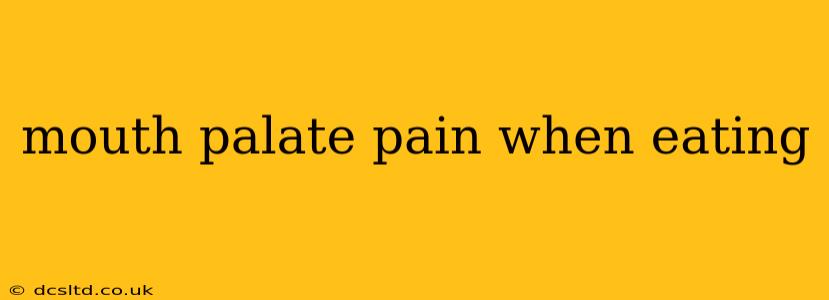Experiencing pain in your mouth and palate while eating can be incredibly frustrating and disruptive. This discomfort can stem from various underlying conditions, making accurate diagnosis crucial for effective treatment. This comprehensive guide explores the potential causes of mouth and palate pain during eating, methods for diagnosis, and available treatment options. Understanding the root cause is key to finding relief and enjoying meals again without pain.
What Causes Palate Pain When Eating?
Several factors can contribute to pain in the mouth and palate while eating. These range from relatively minor irritations to more serious medical conditions. Let's explore some of the most common culprits:
1. Oral Thrush (Candidiasis):
This fungal infection, often caused by Candida albicans, can manifest as a white, creamy coating on the palate and mouth, accompanied by pain and burning sensations, especially during eating. Spicy or acidic foods often exacerbate the discomfort.
2. Mouth Sores (Aphthous Ulcers):
These small, painful ulcers, also known as canker sores, frequently appear on the inside of the cheeks, lips, and palate. They can make eating, drinking, and even talking painful, particularly when consuming hot, acidic, or spicy foods.
3. Burning Mouth Syndrome (BMS):
BMS is characterized by a persistent burning sensation in the mouth, often affecting the palate and tongue. The pain can be exacerbated by eating certain foods, but the exact cause isn't always identifiable.
4. Allergies:
Food allergies can trigger an inflammatory response in the mouth, leading to swelling, itching, and pain in the palate and other oral tissues. Reactions can range from mild to severe.
5. Dry Mouth (Xerostomia):
A lack of saliva can make the mouth and palate feel dry and irritated, leading to discomfort while eating. Dry mouth can be a side effect of certain medications or medical conditions.
6. Damage to the Palate:
Physical trauma, such as burns from hot food or injury from sharp objects, can cause pain and inflammation in the palate.
7. Temporomandibular Joint (TMJ) Disorder:
While not directly impacting the palate, TMJ disorders can cause referred pain in the face and mouth, potentially leading to discomfort while eating.
How is Palate Pain Diagnosed?
Diagnosing the cause of palate pain requires a thorough evaluation by a healthcare professional, typically a dentist or doctor. The diagnostic process usually involves:
- Medical History: A detailed account of your symptoms, including when they started, their severity, and any related factors.
- Physical Examination: A visual examination of your mouth and palate to identify any lesions, inflammation, or other abnormalities.
- Dietary Review: Assessing your diet to identify potential triggers or allergens.
- Tests: Depending on the suspected cause, additional tests might be necessary, such as blood tests, allergy testing, or a biopsy.
What are the Treatment Options for Palate Pain?
Treatment for palate pain depends entirely on the underlying cause. Options include:
- Antifungal medications: For oral thrush.
- Topical treatments: Pain relievers or corticosteroids for mouth sores.
- Lifestyle changes: Avoiding trigger foods and maintaining good oral hygiene for various conditions.
- Medication: For dry mouth or BMS.
- Surgery: In cases of severe trauma or other specific conditions.
How Can I Prevent Palate Pain?
While not all causes of palate pain are preventable, you can take steps to minimize your risk:
- Maintain excellent oral hygiene: Brush and floss regularly.
- Eat a balanced diet: Focus on nutrient-rich foods.
- Avoid trigger foods: Identify and eliminate foods that aggravate your symptoms.
- Stay hydrated: Drink plenty of water.
- Manage stress: Stress can exacerbate some conditions.
Does palate pain always indicate a serious problem?
Not necessarily. While some causes of palate pain, such as oral thrush or mouth sores, are relatively minor and easily treatable, others could indicate a more serious underlying condition. It's crucial to seek professional medical advice to determine the cause and receive appropriate treatment.
When should I see a doctor for palate pain?
You should see a doctor or dentist if your palate pain persists, is severe, or is accompanied by other symptoms such as fever, swelling, or difficulty swallowing. Don't hesitate to seek professional help if you're concerned.
This information is for general knowledge and informational purposes only, and does not constitute medical advice. Always consult with a qualified healthcare professional for any health concerns or before making any decisions related to your health or treatment.
